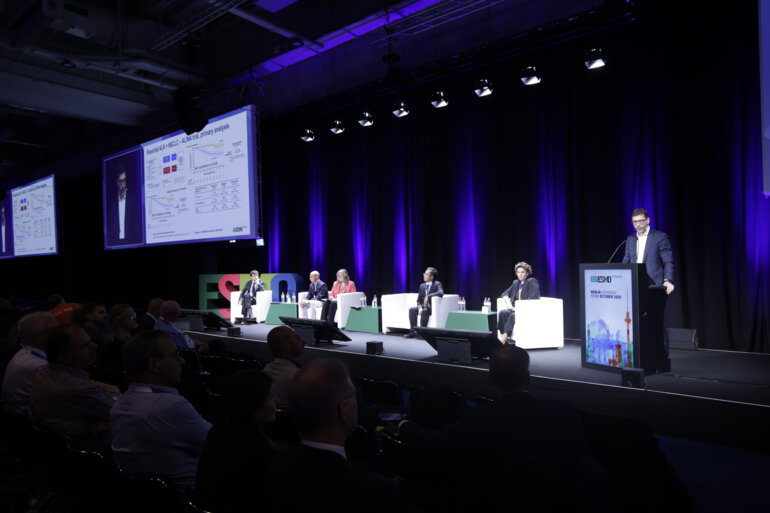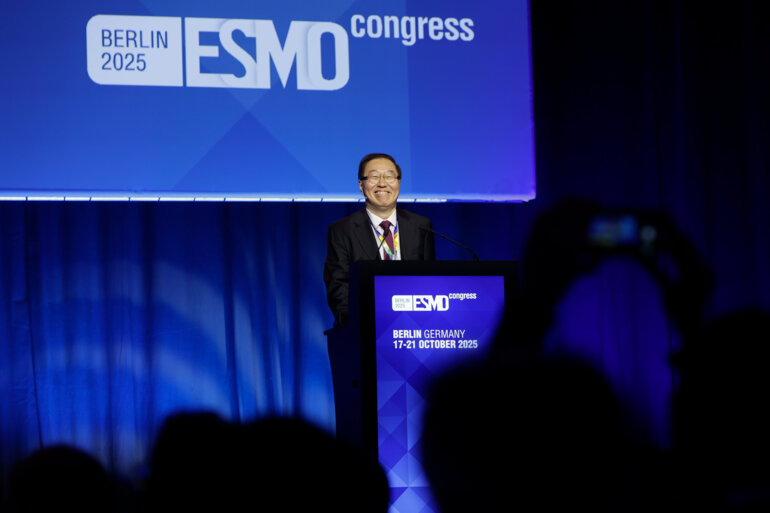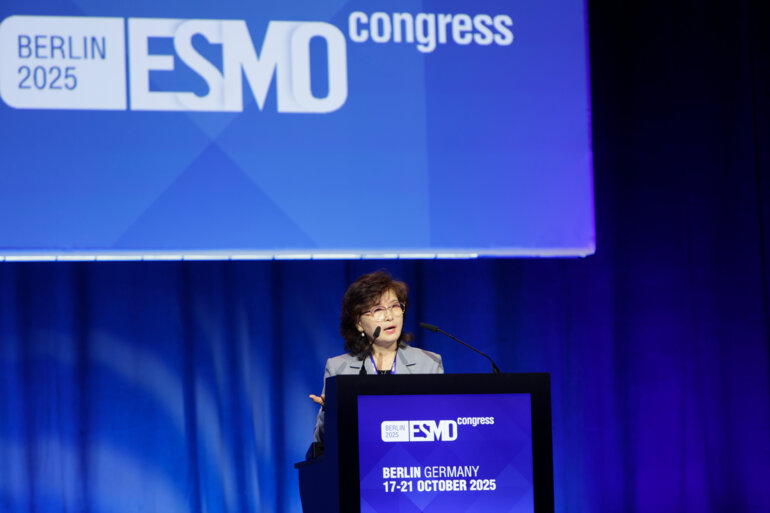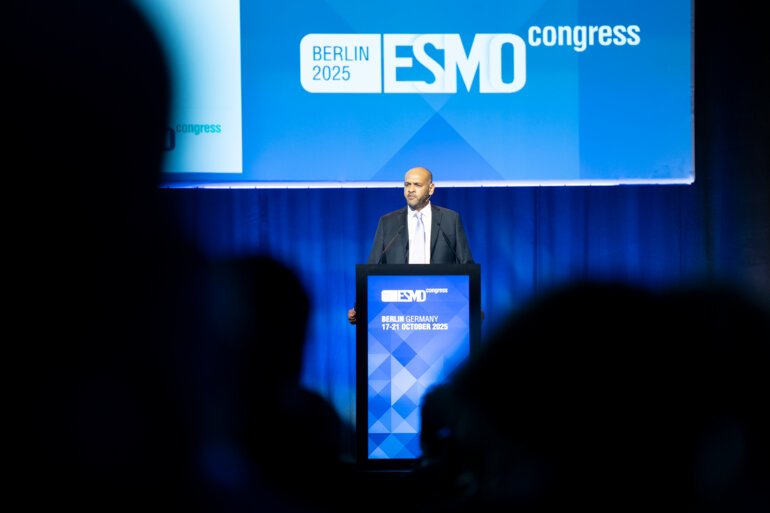Precision targeting, immune modulation and rational trial design are converging to improve patient outcomes
Metastatic non-small cell lung cancer (NSCLC) remains a formidable clinical challenge, yet recent data from pivotal trials investigating innovative agents signal a new era of therapeutic opportunity. In fact, several abstracts presented at the ESMO Congress 2025 (Berlin, 17–21 October) highlight not only incremental advances, but also paradigm shifts in the management of molecularly defined and immunologically complex NSCLC.
The therapeutic armamentarium addressing central nervous system (CNS) metastases, which are associated with poor prognosis in NSCLC, has expanded in recent years, thus making the definition of optimal treatment sequencing critical. The REZILIENT2 trial of zipalertinib, a highly selective EGFR inhibitor, demonstrates meaningful intracranial activity in patients with EGFR exon 20 insertions and other uncommon mutations, including those with active CNS metastases (Abstract 1847MO). While the rates of intracranial response (31%) and intracranial disease control (69%) are encouraging, the safety profile – particularly the occurrence of interstitial lung disease (ILD) – warrants vigilance. Nonetheless, zipalertinib’s CNS penetration addresses a longstanding gap for this population, and ongoing enrolment will clarify its ultimate clinical positioning. Zipalertinib is shaping up as the most promising oral CNS-active option, complementing amivantamab-based first-line standards and sunvozertinib – which was granted U.S. Food and Drug Administration accelerated approval earlier this year for adult patients with locally advanced or metastatic NSCLC with EGFR exon 20 insertion mutations, whose disease has progressed on or after platinum-based chemotherapy.
Until we have head-to-head CNS data from these agents, treatment choice should be individualised by CNS burden, prior amivantamab exposure, and toxicity profiles, while monitoring closely for ILD.
Other findings underscore the transformative impact of molecular stratification and targeted combinations, though the durability of benefit in broader, real-world populations remains to be seen. Updated survival data from the PHAROS study (encorafenib plus binimetinib) in BRAF V600E-mutant NSCLC are striking: median overall survival approaches 4 years in treatment-naïve patients, the longest reported for targeted therapy in this setting (Abstract 1849MO).
Also, the KEYMAKER-U01 umbrella sub-study, testing multiple novel immunomodulators such as TIGIT, CD27 and ILT3/4 inhibitors, atop standard chemoimmunotherapy, shows activity comparable to established regimens (Abstract 1852MO). The true value may lie in identifying biomarker-defined subgroups who derive incremental benefit.
Immunotherapy innovation is evident in the TeLuRide-005 trial where the TLR7/8 agonist, EIK1001, combined with pembrolizumab and chemotherapy yields a 60% response rate without excess toxicity (Abstract 1850MO). Such innate immune modulation may overcome resistance to checkpoint inhibitors, but longer follow-up is needed to confirm durability. Conversely, the PAULIEN trial challenges the routine addition of chemotherapy to pembrolizumab in high PD-L1-expressing NSCLC, finding no significant improvement in early response or survival – an important reminder to tailor intensification strategies (Abstract 1851MO).
Finally, HER2-mutant NSCLC, long an orphan subset, is now at the forefront of research efforts in targeted therapy. Antibody–drug conjugates (ADCs), in particular trastuzumab deruxtecan (T-DXd), have transformed HER2-mutant NSCLC from an orphan space to one with a proven post-progression standard, but ILD vigilance and first-line positioning remain open questions.
As presented from two trials at the ESMO Congress, the tyrosine kinase inhibitors (TKIs) zongertinib and sevabertinib both report response rates exceeding 70% in treatment-naïve patients, with manageable toxicity and promising durability (LBA74; LBA75). Zongertinib has already received U.S. Food and Drug Administration’s accelerated approval with once-daily dosing, while sevabertinib is under priority review with twice-a-day dosing. Future head-to-head, CNS-focused data and sequencing with ADCs will likely guide preference between the two agents in the future.
There is no doubt that the NSCLC field is in rapid evolution and precision targeting, immune modulation and rational trial design are converging to improve outcomes. Yet, the challenge remains to translate these advances into real-world benefit, ensure equitable access, and refine patient selection. As the therapeutic arsenal expands, the onus is on the oncology community to move beyond incrementalism and embrace a truly personalised approach for every patient with advanced NSCLC.
Findings from the phase III trials DESTINY-Lung04 (NCT05048797), Beamion LUNG-2 (NCT06151574), and SOHO-02 (NCT06452277) are now eagerly awaited as they will decide whether ADCs or TKIs may become the first line standard therapy and what is the optimal sequencing, especially for patients with brain metastases.
Programme details:
Ohashi K, et al. Activity of zipalertinib against active central nervous system (CNS) metastases in patients with non-small cell lung cancer (NSCLC) harboring EGFR exon 20 insertion (Ex20ins)/other uncommon mutations. ESMO Congress 2025 - Abstract 1847MO
Johnson ML, et al. Updated overall survival analysis from the phase 2 PHAROS study of encorafenib plus binimetinib in patients with BRAF V600E-mutant metastatic NSCLC (mNSCLC). ESMO Congress 2025 - Abstract 1849MO
Costin D, et al. TeLuRide-005: Phase 2 Study of EIK1001, a Toll-Like Receptor 7/8 (TLR7/8) Co-Agonist with Pembrolizumab (pembro)+Chemotherapy (chemo) as First-Line (1L) Therapy in Stage 4 Non-Small Cell Lung Cancer (NSCLC). ESMO Congress 2025 - Abstract 1850MO
Houda I, et al. Pembrolizumab plus chemotherapy (PEM + CT) versus pembrolizumab (PEM) as first-line therapy for advanced NSCLC with PD-L1 tumor proportion score (TPS) ≥50%: Open-label, phase 3, randomized trial (PAULIEN). ESMO Congress 2025 - Abstract 1851MO
Aggarwal, C, et al. KEYMAKER-U01 substudy 01A: Investigational agents + pembrolizumab (pembro) and chemotherapy (chemo) in untreated stage IV non–small-cell lung cancer (NSCLC). ESMO Congress 2025 - Abstract 1852MO
Popat S, et al. Zongertinib as first-line treatment in patients with advanced HER2-mutant NSCLC: Beamion LUNG 1. ESMO Congress 2025 - LBA74
Le X, et al. Sevabertinib (BAY 2927088) in advanced HER2-mutant non-small cell lung cancer (NSCLC): Results from the SOHO-01 study. ESMO Congress 2025 - LBA75







